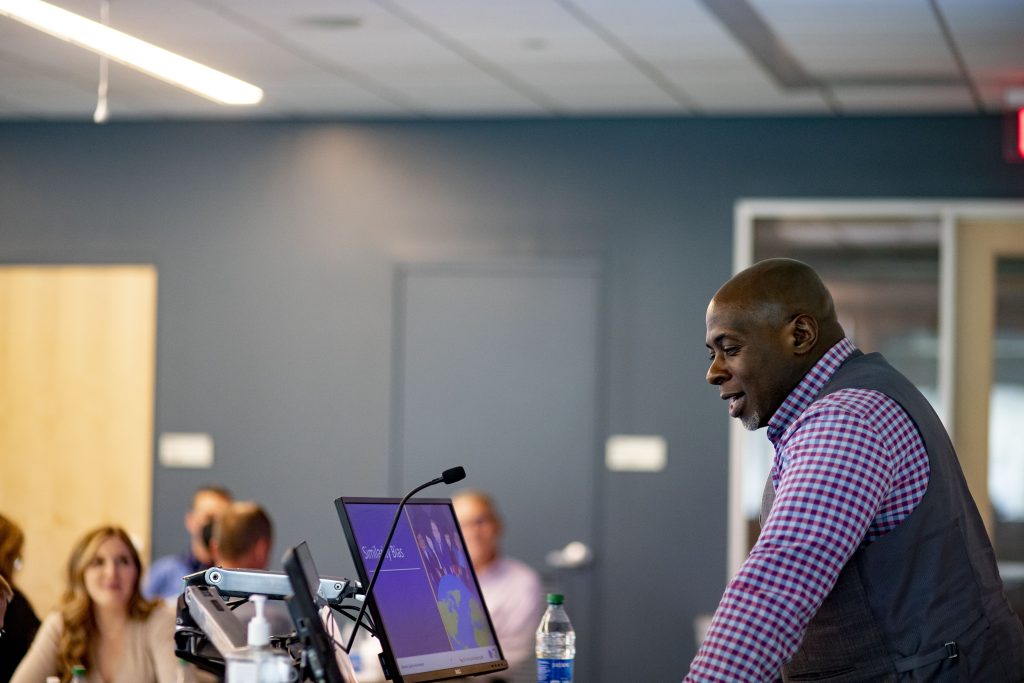The Center for Executive Education offers a range of professional development programming for companies seeking to invest in their workforce’s career goals.
Companies need to demonstrate a willingness to invest in career development for employees.
That’s one of the takeaways of new research published in July by McKinsey & Company, a management consulting firm with offices around the world, including Philadelphia.
According to McKinsey, 41% of survey participants said they quit their jobs because of the lack of career development and advancement with their previous employer.
That finding doesn’t surprise Sheri Lambert, managing director of the Center for Executive Education at the Fox School of Business.
“Having opportunities to grow your skills on both a personal and professional level is absolutely at the top of the wish list in today’s workforce,” Lambert says.
On the employer side, providing opportunities for professional development not only emphasizes a commitment to the current workforce but also shows potential employees that the company is willing to invest in its workforce.
“Retention and recruitment are top of mind these days and choosing to invest in professional development opportunities benefits everyone,” Lambert says. “Your company stands out as an exceptional employer that values its employees. It also sends a message that there are clear paths forward in this organization.”
Employers need to make jobs more “sticky” by showing a willingness to invest in things that are more meaningful and matter to its employees, the McKinsey report says.
“Today’s workforce puts a lot of emphasis on building relationships and nurturing their personal well-being as well as their professional growth,” Lambert says. “It’s important that employers recognize the value professional development can bring to an organization and its workforce.”
The Center for Executive Education works with businesses and nonprofit organizations in a range of industries to develop and customize programming based on a client’s needs. That process begins with a dynamic needs assessment to ensure each component of a client’s program moves the organization forward.
“Because no two companies are alike, it’s important that we tailor the learning experience to align with a company’s expectations and desired outcomes,” Lambert says. “For example, we can host in-person events at one of our three campus locations or take our team to a facility chosen by the client.
“Our program formats range from a traditional lecture-based format to open discussions and breakout sessions where participants can apply what they have learned to real-world situations.”
Virtual programming is also an option for all clients, including those with hybrid or remote workforces across the nation and around the world.
“The wonderful thing about the customization options at the Center for Executive Education is that we can deliver programming in a variety of ways,” Lambert says.
Logistics and format are just part of the equation when it comes to ensuring professional development hits its mark.
“Our experienced facilitators include award-winning Temple University faculty and industry leaders who rely on the latest research and trends to deliver insightful learning objectives,” Lambert says. “We have experience in all areas of today’s business world, from onboarding your newest employees to preparing your rising executives for the demands of the C-suite.”
In addition to custom programming, the Center for Executive Education also offers open enrollment programs for individuals interested in learning new skills or enhancing those they already have.
One of the center’s most successful open enrollment programs is its Women’s Leadership Series. This six-session program offers opportunities to explore executive communication, the art of negotiation, change management and more.
“What we have discovered with our Women’s Leadership Series is there is a clear need for women who share common goals to have an opportunity to build a supportive network of like-minded women,” Lambert says. “Participants in this series often continue their connection after the sessions end.”
Open enrollment programs are available not only to individuals but also to businesses and organizations interested in sponsoring one or more participants.
“The Center for Executive Education couldn’t agree more with the research that shows the value that today’s workforce places on opportunities for career development and advancement,” Lambert says. “We are ready to meet that need.”
To learn more about the Center for Executive Education’s program offerings, contact Sheri Lambert at sheri.lambert@temple.edu or 1-215-204-7533.
